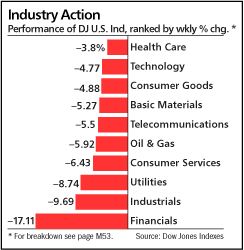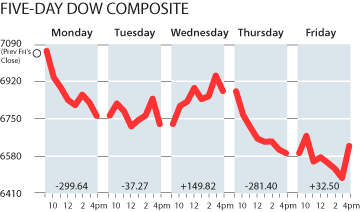From Barrons
After delivering record-breaking earnings and revenue on June 25 for its fiscal fourth quarter, the business-software giant's shares got dinged -- dropping almost a full point, to around 21.68 -- because an overly bullish Morgan Stanley analyst had created unrealistic expectations just days before earnings were released. Profit and sales trends suggest Oracle's shares could still be worth $30.
Since then, the shares have been volatile, much like the market, settling in around 20.86 on Thursday. But little has happened at Oracle (ticker: ORCL) to change our minds since our cover story ("Larry's Payoff," May 19), which suggested the company's bold acquisition strategy was working and that the stock could trade as high as 30.
The empirical evidence and mostly positive commentary -- save for some caution about the economy -- from the earnings call only solidified our bullish premise. Cowen software analyst Peter Goldmacher is maintaining his Outperform recommendation after Oracle reported a 27% gain in quarterly earnings on a 24% increase in sales. Both beat the Street consensus.
Chief Executive Larry Ellison and Chief Financial Officer Safra Catz basically reiterated the fiscal 2009 outlook for profits, which Goldmacher estimates will rise about 16%. His forecast implies new license revenue -- a key measure of software growth -- will rise about 9% for the fiscal year and may prove "overly conservative."
"While the Street still struggles with Oracle's merger and acquisition strategy, customers appear to be embracing it," Goldmacher says. With Oracle shares trading at about 12 times estimated fiscal 2009 earnings, they appear attractive compared with those of German rival SAP (SAP), which trade around 15, he adds.
So why did the shares drop? Morgan Stanley software analyst Adam Holt, formerly of JPMorgan Chase, initiated bullish coverage of Oracle on June 23 -- two days before the earnings call -- with aggressive fiscal-year 2009 earnings estimates of $1.52 a share, compared with the Street's consensus of $1.50. Then he repeated his forecast in a research note published the day of the earnings call. His enthusiasm prompted traders to jump into the stock. Oracle beat the fourth-quarter 2008 consensus, but expressed caution about the first quarter of fiscal 2009 and didn't increase its earnings outlook for 2009.
Such noise and trading aren't unusual in earnings season, and they haven't dulled Holt's enthusiasm. He thinks the shares should hit 29 within 12 months.
Subscribe to:
Post Comments (Atom)



No comments:
Post a Comment